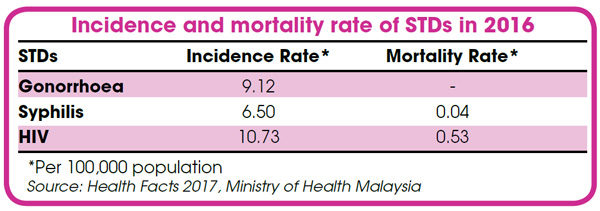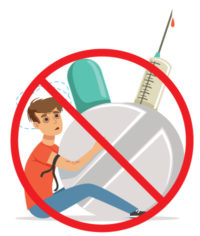Teenagers are at a phase where they are curious about their bodies. Raging hormones may lead them to engage in sexual activities, leaving them vulnerable to sexually transmitted diseases (STDs) and not to mention, unwanted pregnancies.
STDs are diseases transmitted from one person to another through unsafe sexual contact (via vaginal, anal or oral sex). Teaching your teens about STDs should be a part of their sex education. Start educating them as early as possible about the risk of STDs.
How to identify?
More than 25 STDs that are caused by bacteria or viruses have been identified. In the early stages, most STDs may show no symptoms. Hence, the best way to be sure that one is free from STDs is by getting tested.
Symptoms for each STD vary. In general, your teens should see a doctor right away if there is an unusual discharge from their genitals that is yellow, grey or green, and has smelly odour. Sores or rashes, as well as genital or abdominal pain are other early signs of STDs that your teens have to look out for.
Some STDs have distinct symptoms. For example, syphilis comes with swollen lymph glands, and painless sores in the genital area that spreads to palms or soles in later stages. Meanwhile, gonorrhoeal infection can also happen in other parts of the body, causing sore throat, anal discharge or painful bowel movement.
HPV (human papillomavirus) causes itchy warts on the genital area (including vagina, anus and cervix). Most HPV infections do not show any symptoms, but are linked to cervical cancer in the long term.
For HIV (human immunodeficiency virus), some people may have flu-like symptoms the first time they get infected with it, but after several years, it will develop into AIDS (acquired immunodeficiency syndrome).
How bad can it be?
Some STDs like chlamydia and gonorrhoea can be cured, but viral STDs like herpes and HIV cannot be fully cured; medicines can be taken to mediate the symptoms but precaution should be taken during sex. For women, some STDs that are untreated can lead to pelvic inflammatory disease, which causes chronic pain in the pelvic area and the inability to conceive. Untreated syphilis and HIV can be fatal at later stages.
How can we prevent?
Sex education is the first necessary step in prevention. Parents can introduce this topic gradually to their children. Start from as early as preschool age by teaching about private parts and safe touch. As they grow up, discuss more advanced topics appropriate to their ages. This may be a sensitive topic in our society, but parents have to break the taboo and be open to their children.
The surest way of prevention is to practice abstinence: no sexual intercourse, no intimate sexual contact. Teach your teens to say ‘no’ to harmful activities, such as using drugs and alcohol, which can lead to unsafe sex. Educate them about honour, consent and respecting others’ right to refuse. In a relationship, there is no such thing as “If you love me, you’ll do it with me.” Partners should not have to prove their love by doing something that they are not comfortable with, including having sex.
Other ways to reduce the risk of STDs are by using condoms correctly (e.g, never use expired condoms and use it from start to finish), ensuring that you and your partner are STD-free, and avoid having multiple partners.
Vaccines can also help prevent two STDs, Hepatitis B and HPV, which are included in our National Immunisation Programme. HepB vaccine shots are given during infancy, while HPV vaccine shots are given to girls when they are 13 years old. Boys may also get the HPV vaccine at their own request. However, vaccines to prevent other STDs are yet to be developed.
Be responsible!
Empower your teens to be responsible for their bodies. Sexual health is an important knowledge, not just for preventing unwanted pregnancies but also STDs. Begin sexual education from young to prevent bad consequences when they are older. Having an STD can be a traumatic experience. Remember that not all STDs can be treated and the effects can be fatal. Prevention is better than cure.
An educational collaboration with Malaysian Mental Health Association.










Comments